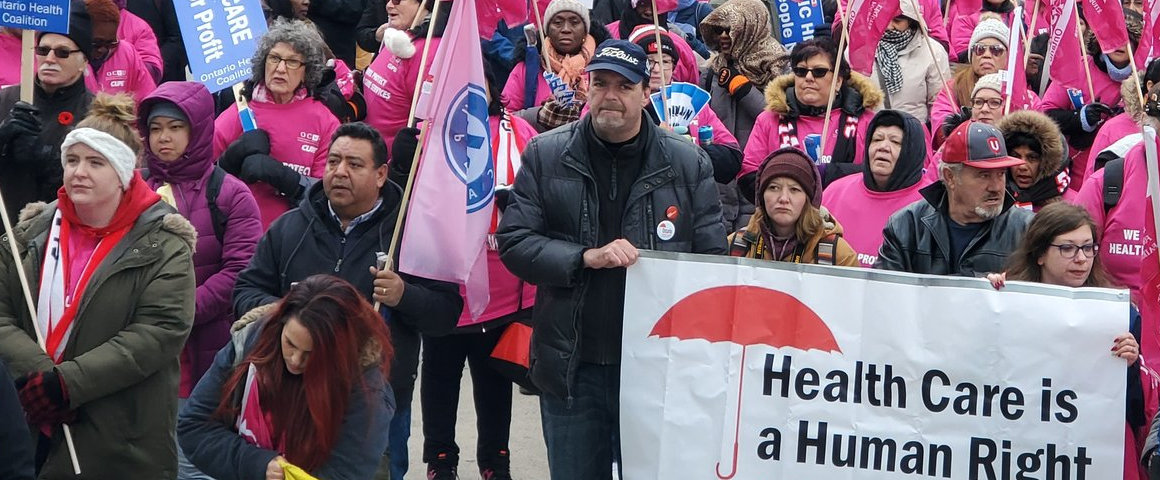In a series of four regional rallies over November and December, the Ontario Health Coalition (OHC), with the support of the local health coalitions and unions and service providers, are not sitting back while the Ontario government restructures the health care system through austerity cuts and privatization.
Rallies have been held in Chatham and Toronto, with two more planned for November 30 in Sault Ste Marie and December 7 in Ottawa.
The rallies are organized by local health coalitions, who are members of the OHC and engage a range of labour and community groups. Ottawa’s rally organizers, for example, include representatives of the Ottawa Health Coalition, the Ottawa District Labour Council, unions such as CUPE, ONA, Unifor and OPSEU, and former city councilors. They have reached out to leaders of the Franco-Ontario community who successfully prevented the Mike Harris government from closing the francophone Montfort hospital in the 1990s, and who mobilized against Ford’s closing of the Francophone office at Queen’s Park and the defunding of the French university in Ontario.
Two issues that are highlighted in the OHC campaign are the government’s plan to merge Ontario’s 35 municipal public health units into 10, and to eliminate 49 of 59 ambulance and paramedic services and 12 of 22 local dispatch centres to centralize the services into 10 regional branches.
The coalition selected these issues because the government has publicly announced these cuts. In the background is the passage in June of Bill 74, the so-called “People’s Health Care Act.” This legislation replaces the 14 Local Health Integration Network (LHIN) units with one super-agency, called Ontario Health and chaired by the Minister of Health. The agency and the Minister have the power to force through mergers, transfer of services, and the closure of local services. They may also force the restructuring of hospitals, long-term homes, home care, community mental health services, cancer care units, eHealth, labs, palliative care and more.
The legislation calls for existing health providers to combine into teams to make proposals to the Ontario Health for funding. Public hospitals could team up with private cancer clinics or long-term care homes to get public funds. Ontario Health and the Health Minister have the power to give public funds to private-for-profit corporations.
The Ontario Health Coalition points out that there is no public interest protection in the legislation whatsoever. There is no public access to information, and no right to appeal decisions of the super-agency.
Resistance to the public health cuts has been swift and widespread. Ontario’s mayors have written the Premier and the Health Minister to reverse these decisions. Toronto mayor John Tory even went door-to-door to get people to sign petitions against the cuts. The Ford government did retreat a bit by delaying the mergers, but public health units are still downsizing because of provincial cuts. The City of Toronto estimates its cuts will be $1 billion over 5 years. The Ottawa Public Health Board was forced to remove $1.3 million in its 2020 budget by not hiring for vacant positions and by replacing some educational work in schools and the community with on-line training sessions.
Who are the forces behind the largest restructuring of Ontario’s healthcare system?
After the 2018 provincial election, an EMS-Vision 2050 Report, penned by owners of a private-for-profit ambulance company, proposed that the Ontario government could save $200 million by consolidating the 50 paramedic units into 10, under the supervision of one Commission. Sound familiar?
Then there is Gordon Campbell, the former premier of British Columbia appointed by Doug Ford to do a fiscal analysis of the Ontario government. His record of health cuts and privatization of public services is the worst in the history of Canada. He fired thousands of health care workers by ripping up their collective agreements and privatizing their services. Private health care clinics doing surgery double-billed patients, in violation of the Canada Health Act. When he got caught doing so, Dr. Brian Day, former head of the Canadian Medical Association, initiated a court challenge against the Act.
Charles Lamman, formerly of the Fraser Institute, is the Director of Public Policy in the Ontario Health Ministry. The Fraser Institute promotes the privatization of health care. Shelly Jamieson, former president of Extendicare and a member of Mike Harris’ Restructuring Commission, is now a member of the Ontario Health super-agency. Ford Appointed Rueben Devlin, former Ontario Conservative Party President as Chair of the Advisory Committee to End Hallway Medicine. When he was CEO of Humber River Hospital, he closed three hospitals and replaced them with one P3 that cost a massive $1.76 billion.
The rallies are only the beginning of the fight against the Ford Government’s restructuring of the healthcare system. The Ontario Health Coalition General Assembly on November 23 and 24 will be an opportunity for activists to regroup and strategize to protect and expand our public health care. For further information, check ontariohealthcoalition.ca.
Stuart Ryan is co-chair of the Ottawa Health Coalition




